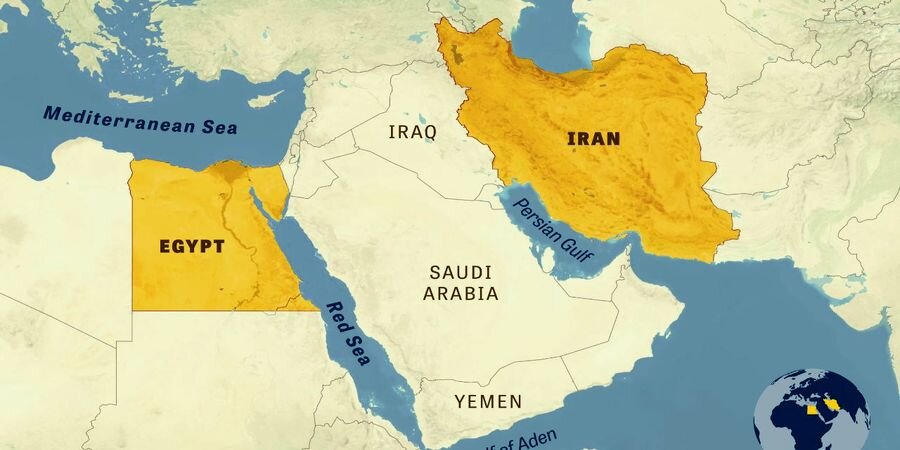Alwaght- Iran's Foreign Minister Abbas Araghchi has visited Egypt, ending at Cairo stop a regional tour that started from last week.
The visit comes as the top diplomat also visited Qatar and Saudi Arabia to send messages amid escalating tensions in the region. Some sources said that Araghchi is conveying a message from Iran's President Masoud Pezeshkian about measures taken to calm the situation in the region.
Araghchi will meet the Egyptian President Abdul Fattah el-Sisi, intelligence chief, and his counterpart Badr Abdel Atti.
Hassan Hanizadeh, an expert on international affairs talked to Alwaght about the goals of the FM's regional tour, saying that Araqchi's visits to regional countries , starting from Lebanon and Syria, then Qatar and Saudi Arabia, and finally ending in Egypt demonstrate the fully active diplomacy of the Islamic Republic of Iran in line with Axis of Resistance and will highly influence the convergence between Iran and the Arab countries.
Also, having in mind that Egypt is one of the biggest Arab countries and has an influential role in the Arab-Israeli dispute. Araghchi in his visit tries to explain the Israeli crimes in Gaza and Lebanon to use Cairo's influence on the Arab League and the (Persian) Gulf Cooperation Council.
Commenting on the speculations about the Iranian message to the Arab countries, Hanizadeh said: "It is natural that Mr. Araghchi, during his trip to Saudi Arabia and Qatar, sent a serious message to these countries and others telling them that the skies of these countries should not be opened to the Israeli aggression planes and even the US against Iran because Iran will definitely respond decisively and the countries that cooperate with the Israeli regime and the US will surely receive a painful response from Iran."
"Unfortunately, some Arab countries in the region have supported the Zionist regime during the Gaza war, especially in Iran's Operation True Promise II, some countries in the region intercepted some Iranian missiles launched at the occupied territories, and this is in a way a partnership with the Zionist regime in the massacre of Gaza people. Iran intends to give a severe response to such actions," said Hanizadeh.
The political expert highlighted the Egyptian historical position in the Palestinian dispute and the expectation of the Muslim world from Cairo. He added: "Egypt is a large Arab country and its important geopolitical position in the Mediterranean Sea, the Red Sea and the common border with occupied Palestine and a large population has given great importance to Egypt's position among the Arab countries and it is expected that this country will play a deterrent role. In the meantime, although Egypt has tried to establish a ceasefire in Gaza during the war and was part of 17 rounds of negotiations between the actors of the Gaza crisis, all of which failed because of Israel's treachery, this country is expected to stand by the Resistance camp given the wars it had with Israel and the damages it suffered from establishment of Israel. Unfortunately, Egypt moved out of the Arab resistance camp with the humiliating Camp David Agreement with Israel and now has a neutral role in regional developments and sometimes even chooses silence to the Israeli crimes. Therefore, the Muslim world expects Egypt to cut off its relationship with the Zionist regime, at least under these conditions. Jordan, as a country where more than 60 percent of its population have Palestinian roots, must play its deterrent role against Israel. Unfortunately, these two countries have not only failed to help the Palestinian nation, but also have played a role in shooting down the rockets launched by Iran-led Axis of Resistance against the Zionist regime."
From another aspect, the visit comes as the two countries have no official diplomatic relations, but in recent years, diplomatic rapprochement has been on agenda of Tehran and Cairo, though moving slowly.
Commenting on following up this process during Araghchi's visit, Hanizadeh said that "in fact, there are two approaches in Egypt that have caused delay in the exchange of ambassadors and the completion of the process of détente between Tehran and Cairo. While the Ministry of Foreign Affairs of Egypt thinks that Iran is an influential country in the region and establishing relations with Tehran is necessary, some security agencies in Egypt believe that due to Iran's specific religious structure and the high acceptance of Shiite faith by the people of Egypt, the Egyptian social and religious body may take damages after relations are improved and this may cause troubles to the government. So, these two approaches in Egypt have always stood against one another in Egypt, making Tehran-Cairo relations staying at lowest levels, while the two are big Muslim countries and if they have balanced relations , they can cooperate to settle many challenges in the Muslim world."



























